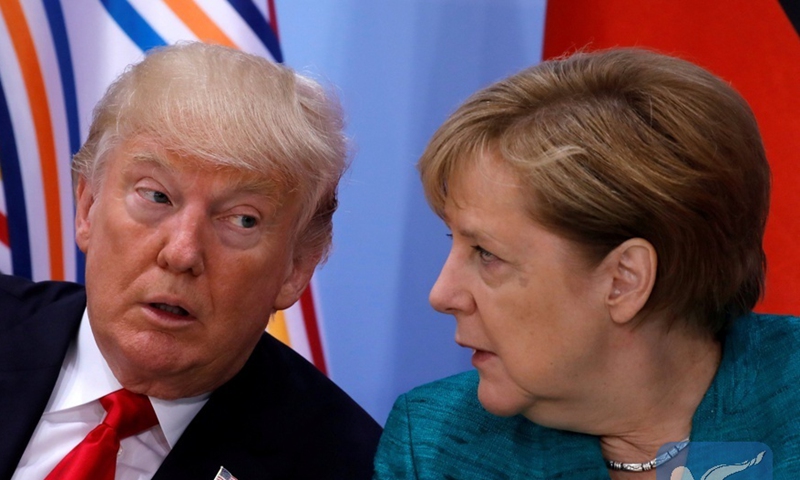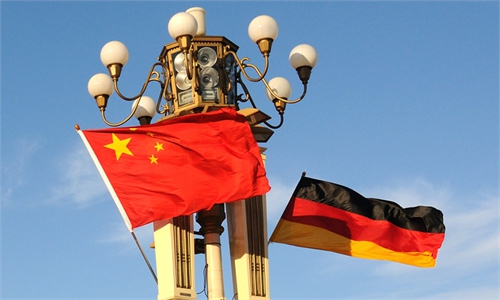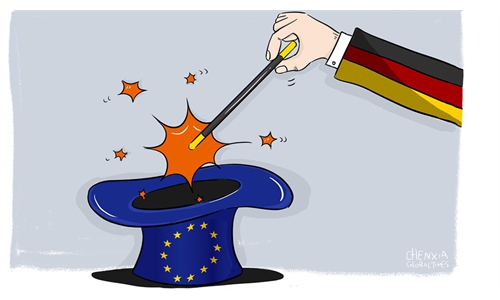
US President Donald Trump and German Chancellor Angela Merkel attend the Women's Entrepreneurship Finance event during the G20 leaders summit in Hamburg, Germany July 8, 2017. Photo: Xinhua
Almost four-fifths of Germans would be in favor not to interfere in a dispute between the US and China, according to a survey published on Sunday by Berlin-based Infratest Dimap institute. It was commissioned shortly before Christmas by Welt am Sonntag, a local media outlet.The poll's results can be seen as largely representing the general opinion of European people. In areas such as climate protection, green development and energy resources, Europe will make strategies independent of the US based on the interests and ability of the European Union (EU). Europe's right to self-determination will not change - whether it is Donald Trump or Joe Biden in the Oval Office. Despite US has demands from it, Europe will try to take care of US emotions but not obey every order they get.
The results of the survey also have a strong directional effect for the German government. US President Donald Trump didn't treat Germany well, and the German people are already upset of it. There are pro-American groups in Germany, and many media outlets have published articles against China during the COVID-19 pandemic, saying that Germany should stand with the US and decouple from China. But the fact is that China has done a good job, and the mutually beneficial results of China-EU cooperation are obvious to the public.
As part of Trump's push to make China his main competitor after 2017, Washington has increased pressures on its allies to go against China. Despite the Trump administration's problems with Germany over military expenditures and other issues, US' strategy of drawing Europe into confrontations with China cannot be implemented without Germany's participation.
Berlin suffered a lot in Washington's competition against Beijing. Germany's long-standing alliance with the US and the counterweight of NATO decide that it could not simply reject US' demands.
However, the national interests of Germany and the US are not exactly consistent. Berlin began to give a new response to Washington's demands. They partly echoed US remarks over China's Hong Kong and have refused to follow the US suit on issues such as economic decoupling from China. Germans' desire for neutrality is a manifestation of Europe's pursuit of "strategic autonomy."
Trump's biggest problem is that he asked Berlin to cooperate with Washington without considering Germany's interests in China. Meanwhile, he has kept pressures on Germany's own national interests, such as implementing sanctions on German Nord Stream 2 pipe construction and slapping tariffs on European products. German people are already quite angry with these actions.
In 2019, the Federation of German Industries' report on China defines the Asian country as a partner and competitor. This shows that Germany is wary of China's rise in recent years, especially the success of socialism with Chinese characteristics. However, Germany's China policy is not a black or white problem. The economic cooperation between China and Germany is to some extent one of the lifelines for Germany.
The US is targeting China because it sees China as a challenge to its hegemony, but Germany does not see China as a threat.
In addition, it is impossible for Germany and Europe to decouple from China in fighting against COVD-19 pandemic. And on global governance regarding issues such as climate change, Europe also needs to cooperate with China.
Germany has a vision as a great power. Under the keywords of multilateralism, great power competition and strategic autonomy, the country has started to make changes. Their multilateralism is in stark contrast with US' unilateralism under President Trump. And the great power competition for Germany is the competition and cooperation between the US, Russia, Europe and China. It is not merely about an Atlantic alliance proposed and lead by the US targeting against China.
After Biden takes office, the US will continue to ask Germany to cooperate with its strategy, but the methods will be changed. There will be more cooperation between the US and Europe, but Europe's basic position will not change.
In this context, China's own foreign policy will be of great significance. One of the ways in which the US has tried to woo Europe has been to emphasize the opposition on institutional and ideological values between Europe and China. China needs to strengthen cooperation with the EU, manage differences and build China-EU relations on the basis of mutual benefits. These can greatly reduce the influence of pressures exerted by the US on Europe.
The author is a research fellow at the China Institutes of Contemporary International Relations. opinion@globaltimes.com.cn


